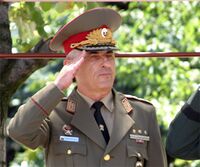Valentin Stavrik
Valentin Stavrik | |
|---|---|
 Kochanov in 2007 | |
| Born | 22 August 1957 Parjov, Makedon |
| Allegiance | |
| Service/ | Syaran National Army |
| Years of service | 1988 - 2010 |
| Rank | Colonel General |
| Unit | 9th Army |
| Battles/wars | Refusal War Imerti Conflict Zemplen War |
| Awards | see below |
Valentin Stavrik is a Syaran former general best known for comamnding 9th Army during the Zemplen War.
An ethnic Makedonian, Stavrik originally served alongside the Royalists before defecting to the Wardens in 1987 during the Refusal War. Stavrik was commissioned into the Syaran National Army in 1988 as a Lt. Colonel, rising to the rank of Colonel in 1996 and later Brigadier General in 1999. In 2001 he was promoted to Major General and given command of the 20th Mechanized Infantry Division. In 2005 elements of the 20th Division were deployed to Imerti during the Imerti Conflict; afterwards Stavrik was promoted to Lt. General in 2006. Following the outbreak of the Zemplen War Stavrik was promoted to Colonel General and given command of 9th Army for the August Offensive. During Operation Aspis 9th Army served as the southern flank of Army Group Beta as it advanced into Ruvelka. 9th Army came under heavy attack during the Ruvelkan Winter Counter-Offensive and was forced to retreat, though it ultimately regrouped and halted the Ruvelkan advance. Occupying rugged and mountainous terrain, 9th Army was forced to string itself out along a wide front across almost all of the Balatonalmádi District, which made it a frequent target for Ruvelkan counter-offensives. Unable to make much progress towards its target city of Székesfehérvár, 9th Army spent much of the war holding static positions, with Stavrik primarily aiming to keep the flanks of Army Groups Beta and Gamma secure. During Operation Homefront 9th Army was rapidly forced to cede ground in the face of the Ruvelkan onslaught, with Stavrik being the first army commander to order a general retreat. Stavrik retired from the SNA just a few weeks after the war ended in September 2010.
Stavrik's reputation as a field commander has been the subject of discussion and contention among historians and analysts. Stavrik had earned a reputation as a stoic and quiet person before and during the war, something that occasionally served as an annoyance to his comamnder Field Marshal Arisdages Koundakjian. Criticism of him rests primarily on the very limited progress 9th Army made throughout the war, during which it failed to launch any major solo offensives and was frequently forced to retreat by Ruvelkan attacks. Defenders of Stavrik argue that his forces occupied a fundamentally poor position that was not conducive to any major operational success, and credit 9th Army's resilience and ability to repeateadly bounce back as evidence of Stavrik's skill as a leader and administrator. Stavrik's quick retirement after the war is widely believed to have been influenced by the deaths of both of his sons , who were killed during Operation Harpe and the Battle of Sagerejo.